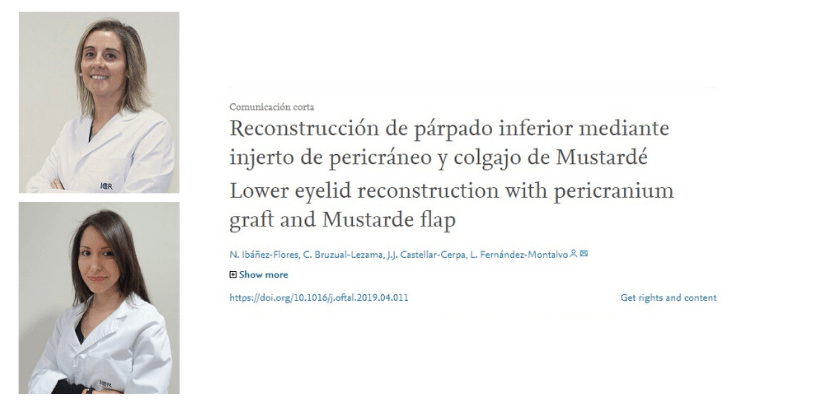
The magazine Archivos de la Sociedad Española de Oftalmología has published an article written by the Department of Orbit and Oculoplasty of ICR which deals with a case of lower eyelid reconstruction with pericranium graft and Mustarde flap.
The article addresses the case of a 68-year-old patient who attended the consultation with a basal cell carcinoma tumor (a type of skin cancer) that affected his left lower eyelid. Due to the difficulty in clinically identifying its margin and the diffuse nature of the injuries, a surgical resection of the tumor and an anatomopathological diagnosis were performed in the same surgical act. This left a large cutaneous defect that affected the inner canthus, two thirds of the lower eyelid and 2.5 cm of the cheek. For the complete reconstruction of the defect, the posterior lamella of the lower eyelid was reconstructed with a pericranial graft with the aim of providing posterior support (posterior lamellar); Additionally, the anterior lamella was reconstructed with a Mustarde cheek flap, which provided good functional and aesthetic results. After 12 months of follow-up, the patient presented an adequate appearance, good eyelid support and a good functioning of the eyelids.
The reconstruction of the lower eyelid and the inner canthus is often an important challenge for oculoplastic surgeons. The use of pericranial tissue together with a Mustarde flap can be a good surgical alternative to obtain adequate aesthetic and functional results in large defects that last over time. The flap not only provides additional skin of a correct colour and texture, but also guarantees an adequate blood supply for the pericranial graft. Likewise, it was also found that pericranial grafting is a good option to reconstruct the posterior lamellar, which provides enough tissue to cover large defects, with adequate volume and a painless postoperative period.
You can consult the full article on the website of Archivos de la Sociedad Española de Oftalmología.
Contact us or request an appointment with our medical team.